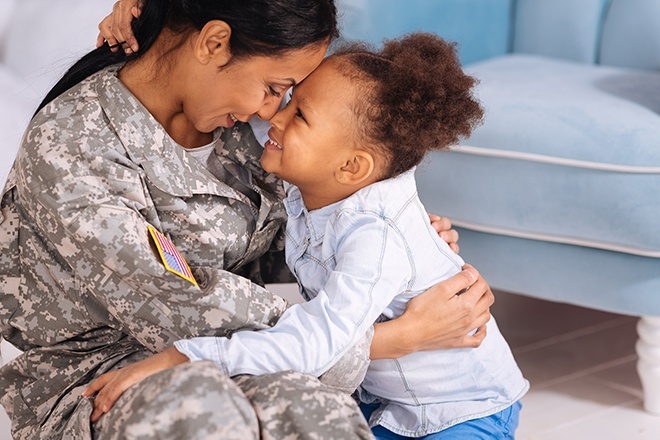Tomorrow is Veteran’s Day, when we honor all the brave men and women who have served our country. In addition, all of November is Military Family Appreciation Month, when families are recognized for their commitment and contributions in support of our military and nation.
Our country is facing one of the most challenging times in our history, with social unrest, economic hardship and a deadly pandemic. Kids and adults alike are fearful that their loved ones may contract COVID-19. Many have grandparents in nursing homes and assisted living facilities whom they are unable to see. And we are about to embark on a holiday season where our traditional family gatherings likely need to be put aside.
Sadly, some children are dealing with the grief of having lost parents, grandparents or other beloved family members.
For military families, these worries and losses are compounded by unique challenges. Children in these families often must deal with lengthy separations from their parents—difficult on their own, but add to that the fear that a loved one may not come home, and it’s clear why these kids are under enormous stress and experiencing heightened anxiety and depression.
Plus, military families relocate 10 times more often than civilian families—on average, every two or three years, so children face separation not only from their parents, but from their friends.
Not surprising, studies show that one third of school-age military children show behaviors such as being anxious, worrying often and crying more frequently.
Luckily, there is something parents can do to care for their kids—and themselves—when facing a deployment. Here’s some advice from KidsHealth:
- Be honest. The words you use are important and can mean different things depending on a child’s age and maturity, so give kids the truth in terms they can understand.
- Let kids know that they will be taken care of. Kids need to feel protected in a parent’s absence, so tell them who will be taking care of them during the time away.
- Make a plan to stay connected. Let kids know that goodbyes are hard for everyone — even grown-ups. Remind them that they’ll be thought of and loved while the parent is away and talk about the people who will be there to help them feel better when they’re feeling sad.
- Spend extra time together. In the days and weeks before departure, many military parents feel pressure to get the house in order by tackling their overloaded to-do lists. Though fixing leaky faucets and taking the car for a tune-up are important, so is plenty of one-on-one time with each child.
- Keep a routine. Help offset feelings of uncertainty by keeping life at home as predictable as possible. In the face of big changes, even small things that stay the same — like a simple bedtime routine or a fun Saturday morning ritual — can be extremely reassuring.
- Keep the absent parent a part of children’s lives. Whether it’s counting down days on a calendar, making a scrapbook or organizing an activity your loved one would like, encourage your kids to find creative ways to stay connected to the parent who’s away.
- Talk often and listen well. Talk to them about the things that upset them and let them know it’s OK to feel worried sometimes and that you feel that way too.
- Get support. A parent’s departure is not only unsettling for the kids, but also overwhelming for the partner who must absorb all the extra duties. The armed forces have many programs to help families get through the tough times. Visit www.usa.gov/military-assistance for information.
Remember, North Shore Child & Family Guidance Center is here for your family! Call us at (516) 626-1971 for help.
















